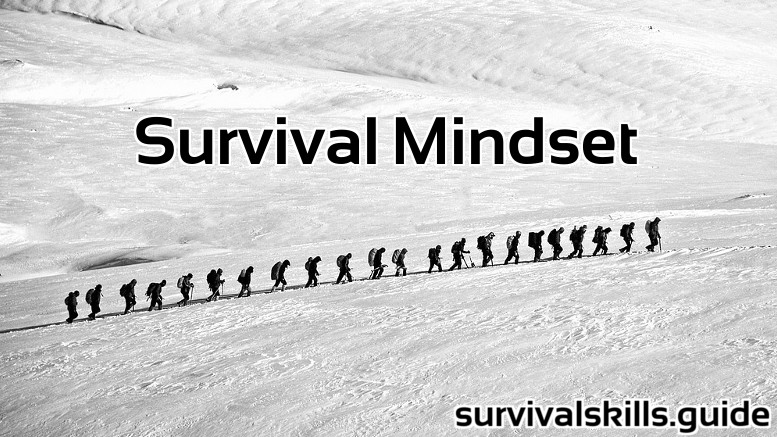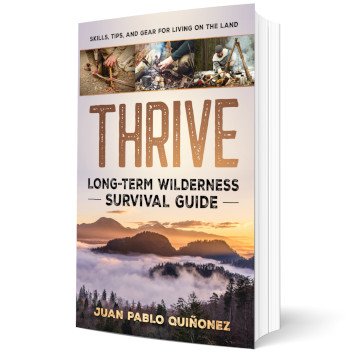“Survival is 90 percent psychology. When the chips are down, it doesn’t matter what you have buried in the backyard or how many books on survival you’ve read. If you’re a mental and emotional basket case during your survival episode, you’re toast.” Cody Lundin, 98.6 Degrees.
Last winter I was preparing for what would have been my toughest survival expedition; long story short, I’m not going on it due to circumstances out of my control. I’m sharing the tactics and strategies that I planned to use. They can help you attain a survival mindset, increase your mental resiliency, keep you motivated, and in a positive mental state. Some of these tactics have been used by athletes to increase mental toughness, POWs have used them during captivity, and many people use them everyday for mental health.
Survival manuals and courses will teach you that having a positive attitude is the most important aid you can have during a survival situation, but they generally don’t have much to say about how to keep a positive mindset through adversity. This article aims to give you actionable techniques to keep in your toolbox, and practice in your everyday life.
Physical Health and Fitness
There is no separation between mind and body. The influence of chronic hunger, thirst, sleep deprivation, and mind altering substances make it clear that the mind is hugely affected by the body. The opposite is also true.
Mind over matter is not always the case. You can’t just stop breathing for a day, or stop hydrating for a week. We live in a material world and have few, but very real, material needs.
One should take care of their body to take care of their mind. This is the most important tactic for having a good mindset. Unfortunately by the nature of a survival situation, this won’t always be possible.
Focus on the survival priorities to fulfill your most immediate biological needs like hydration and warmth. Hypothermia, dehydration, and starvation can really mess with your mind, so take action before you find yourself in a slippery slope.
Physical fitness can play a huge role in keeping your mind positive through adversity. A fit person would be more likely to overcome a physically challenging situation; fitness can give you the confidence and edge needed to succeed. For instance, being able to hike in difficult terrain or to use an axe with ease could be huge advantages.

Training and adventuring
Being familiar with the challenges that could arise makes it easier for the brain to act. If you are way out of your comfort zone and you are unfamiliar with the steps that need to get done, you could panic or freeze. But if it’s not your first rodeo then you can better focus on the whole picture and stay aware of your mindset. A mind less experienced and trained would be more stressed out and overloaded in comparison to one that has practised survival skills to the point where they are almost unconscious.
Adventures and training expose you to physical and mental hardships. Being out of your comfort zone regularly helps your mind become more adaptable and strengthens your mental toughness. Gradual training can boost your proficiency and confidence.
“The more you sweat in peace, the less you bleed in war”
Will Power
Research tells us that will power is limited and can be exhausted. But will power is also renewable and can be strengthened if used often. Doing things with a non-dominant hand, dieting, exercising regularly, and many other activities that require discipline are ways of using and strengthening your power of will. Challenging yourself to get out there when you don’t feel like it: when you’re tired, or the weather’s not ideal, will strengthen your discipline.
Will power could be needed for most survival task; survival is not easy. Extinction is the rule, survival is the exception. Will power could be the only thing standing between focusing on improving your situation, and being a hopeless victim.
Daily cold showers are a great, and convenient way of strengthening your willpower and building mental resilience. Adjust the shower to the coldest setting and get in there for two minutes. Gradually progress to 5 minutes. Don’t use hot water after the shower. Put on warm clothes or exercise if you need to rewarm. Cold showers can be very uncomfortable and that’s why they are so effective. Forcing yourself to do something unpleasant everyday, even in the days when you least want to will increase your willpower.
To counteract the depletion of your will power, try to achieve your tougher objectives early on.
Compartmentalizing
This is a common strategy used amongst soldiers during hell week. Complex or difficult objectives should be simplified into smaller checkpoints or steps. The more difficult the goal the smaller the steps. People in this situations often divide objectives into days, meals, minutes, and steps.
Having simple, feasible objectives allows the mind to have small wins and focus only on the immediate objective rather than trying to wrap around a much longer and difficult goal. Once the objective is attained you can focus on the next one. Break the thousand mile journey into baby steps.

Gratitude
Record, write or reflect about your daily small wins. Practice gratitude often, reflect daily on 3 things you’re grateful for. It’s easy to get caught up in looking ahead, striving for the future. Take a moment tonight to appreciate what you have. Gratitude builds mental resilience, when you’re in a positive mindset, stressors and challenges become easier to handle.
Self Compassion
Treat yourself with the kindness that you would show a friend. If you make a mistake, don’t ruminate over it. Learn from it and move on. Improvise, adapt, overcome. Losing crucial equipment or making big mistakes can be huge setbacks, don’t make your situation worse by beating yourself over them.
Impermanence
There is nothing permanent except change (Heraclitus). Hardships will eventually end. Rather than thinking about the entire situation, focus on the fact that it will end, and in the meantime, control smaller parts of it. Remind yourself during you most painful moments that things will improve.

Passion and Purpose
Having meaning and purpose in your life can be a huge driver and support during difficult times. Try to define your why. Why are you in this world?
Why is this so important that you are willing to go through blood, sweat and tears for it? What (be specific) do you want to achieve? Why is it important to you? Make this “why” your mission statement and repeat it to your self.
He who has a why to live for can bear with almost any how (Friedrich Nietzsche).
Faith
Having faith in a higher power or oneness can be a huge mental aid. Just like having passion and purpose, faith can function as a support during difficult situations.
Meditate
Meditating for 10-20 minutes is not only calming for the mind, but it will also exercise your power of concentration. The ability to focus is directly related to your will power.
Box Breathing
Breathing exercises like box breathing can reset your mental rhythm and take your mind off a negative path of fear, panic, or anger. They are very effective at calming and improving your mental state.
SMART Goals
Having specific, measurable, attainable, relevant, and time-bound goals can help your mind be organized and focused. Having a clear vision of the things you need to do will make things more achievable. Daily goals help you maintain control over yourself.
Mindfulness
Paying attention, on purpose, in the present moment and non-judgementally, moment to moment, has many benefits. Mindfulness can be an excellent coping mechanism.
Feed the Positive Mind
In the book The Way of the SEAL I read about this parabole. Your thoughts feed two wolves in your mind. Positive thoughts feed the positive wolf and negative thoughts feed the negative wolf. Which wolf do you want to feed the most, which wolf do you want to grow bigger and stronger?
Focus on thoughts that make you feel tougher, stronger, grittier. If you have made a mistake and you keep beating yourself over it fight your rumination with a 2 minute distraction.
Cody Lundin writes in When all Hell Breaks Loose about how everyone sees life through their own tinted lenses. By influencing what we think, feel, speak, act, and focus our attention upon, we can change our reality. Our attitude functions as a filter that can make improve or worsen our situation.
Continuous Improvement
Ask yourself what can you do in this moment to improve your situation. Work on tasks that you can finish in a day that will make you more comfortable, make your systems more efficient, have more food procurement means, or keep a positive attitude.
Mantra
Powerful and inspiring mantras can become a source of strength. Make your own short, but personal mantra that makes you feel strong and empowered. Positive affirmations and I am statements form strong mantras. Having a mantra with a spiritual component helps.
“This will pass” “Not death, can’t quit” “You got this” “One day at a time” “Yes I can” “I am stronger than I think”
At Stake
What’s at stake? Reflect on what you have to loose if you fail. What can you gain if you succeed?
Obstacles
There will be setbacks along the way: You will fail to achieve a short-term goal due to forces beyond your control. In these moments, you can’t let your disappointment in one small failure break down your entire endeavour. Improvise adapt overcome. In fact, if you are not encountering defeat on a fairly regular basis, you are not trying hard enough. And absolutely refuse to accept less than your best.
“The fundamental difference between an ordinary person and a warrior is that a warrior takes everything as a challenge, while an ordinary person takes everything as a blessing or a curse.” Carlos Castaneda.

Time for Self-care
Self-care could mean just taking care of the basics like eating, resting, sleeping, or going for a walk. But it can also mean taking a break. Whatever gives you a mental break so you can come back with fresh eyes.
Forty Percent
When your mind is telling you you’re done, you’re really only 40 percent done. When you hit that wall, you’re really only 40 percent through your stores of energy and determination.
Failure
Give a hundred percent, real quality effort. Be okay with failure, as long as you do everything you can to succeed. Fail going 100%.
Don’t quit in darkness: do not take an impulsive decision during your lowest point.
Focus on the Process
Learn to enjoy and appreciate the process. Focusing on the process and the experience keeps us motivated, learning, growing, and enables us to move closer to our desired outcomes. Results driven, action focused.
Visualization
Visualize achieving the tasks that need to get done. For instance visualize fulfilling your basic needs. Enrich your visualizations by focusing on your five senses. Get specific! Visualize being back with your loved ones.
Mental imagery works in many ways to make your visualizations more achievable, from forming mental pathways (muscle memory) to strengthening your emotions and motivations towards a goal.



Hey, you’re back. :^)
I’ve never been in a desperate situation with a clear choice of Life or Death, but attitude on how you choose to deal with it is a huge consideration. Just finished re-reading Yossi Ginsburg’s book LOST IN THE JUNGLE and it demonstrates that if you are not willing to just ‘press on’, your survival is very likely to end quickly.